 Petzlover
Petzlover Braque Francais (Gascogne Type) is originated from France but Nenets Herding Laika is originated from Russia. Braque Francais (Gascogne Type) may grow 11 cm / 5 inches higher than Nenets Herding Laika. Both Braque Francais (Gascogne Type) and Nenets Herding Laika are having almost same weight. Both Braque Francais (Gascogne Type) and Nenets Herding Laika has almost same life span. Braque Francais (Gascogne Type) may have more litter size than Nenets Herding Laika. Braque Francais (Gascogne Type) requires Low Maintenance. But Nenets Herding Laika requires High Maintenance
Braque Francais (Gascogne Type) is originated from France but Nenets Herding Laika is originated from Russia. Braque Francais (Gascogne Type) may grow 11 cm / 5 inches higher than Nenets Herding Laika. Both Braque Francais (Gascogne Type) and Nenets Herding Laika are having almost same weight. Both Braque Francais (Gascogne Type) and Nenets Herding Laika has almost same life span. Braque Francais (Gascogne Type) may have more litter size than Nenets Herding Laika. Braque Francais (Gascogne Type) requires Low Maintenance. But Nenets Herding Laika requires High Maintenance
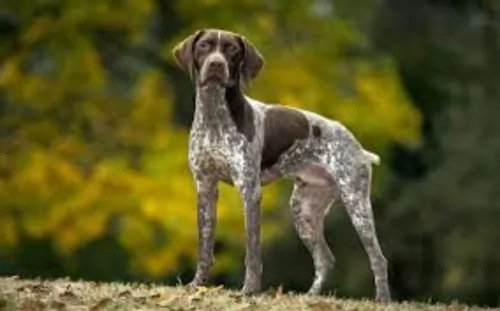 The Braques Français – Gascogne – is a hunting dog from southern France’s Gascony region. Known also as the French Gascony Pointer, this dog has descended from Spanish and Italian Pointers. The dog was saved from extinction at the turn of the 20th century.
The Braques Français – Gascogne – is a hunting dog from southern France’s Gascony region. Known also as the French Gascony Pointer, this dog has descended from Spanish and Italian Pointers. The dog was saved from extinction at the turn of the 20th century.
There are actually two breeds of Braque français, with the other being somewhat smaller and known as Braque français, type Pyrénées. Whichever one you have, they are popular hunting dogs in France. The first breed club was established in 1850.
 There is a large variety of Laika dogs as the word is almost a generic term for a type of Russian hunting dog. They are found in Northern Russia and Siberia and there are several recognized by the Federation Cynologique International including the East Siberian Laika, the Russian European Laika, and the West Siberian Laika. These Siberia Laika are crosses between the aboriginal dogs of Siberia and northern Russia. The word Laika means a barking dog and comes from the word meaning to bark. These laikas are working dogs, hunting pointers that were bred specifically for their barks.
There is a large variety of Laika dogs as the word is almost a generic term for a type of Russian hunting dog. They are found in Northern Russia and Siberia and there are several recognized by the Federation Cynologique International including the East Siberian Laika, the Russian European Laika, and the West Siberian Laika. These Siberia Laika are crosses between the aboriginal dogs of Siberia and northern Russia. The word Laika means a barking dog and comes from the word meaning to bark. These laikas are working dogs, hunting pointers that were bred specifically for their barks.
All the dogs in this category are loyal and affectionate. They are hard workers and hunters/herders and sled dogs. Of the official Laika groups including the Nenets Herding Laika, there is the Karelo-Finnish Laika, the Northeasterly Siberian Laika, the West Siberian Laika, The Russian European Laika, Eastern Siberian Laika. The Laika are wary of strangers, noisy and rowdy.
The Laika breed known as the Nenets Herding Laika is also called the Reindeer Herding Laika. The breed is pretty ancient, developed by the Nentry tribe at about the same time that the nomads were developing the Samoyed. Like the Samoyed breed, the Nenets Herding Laika herded Reindeer. The artic breed originates from Russia and can be used for transportation and hauling as well.
While their temperament and history are very much the same as the Samoyed, they are recognized as separate breeds. However there are many aficionados of both breeds believe that the Samoyed and the Nenets Herding Laika are the same breed. For many the Samoyed are simply a white version of the Nenets Herding Laika.
The Nenets Herding Laika is also know as the Samoyed Laika, so you can see how close if not the same, these two breeds are. The Nenets Herding Laika was bred by the Nenet peoples. The Samoyed is all white while the Nenets is any variation of black, gray, piebald, red, white, sable and brown.
The dogs herd and guard reindeer, keeping the herd together and moving them from one pasture to another. They will also stay with a stray reindeer until they are found. They will do this whether they have food or water. They will bark to try to bring the people’s attention to the lost reindeer. They are also an excellent hunting and retrieving, swimming dog.
The Nenets are also known as Yurak Samoyeds and they are the largest group of Samoyedic peoples today. They live on both sides of Russian Ural Mountains in northern Russia and the Yamal Peninsula. They move large herds of reindeer to the winter lands south of the Artic Circle from the north – about 600-900 miles. It is believed that the Herding Laika originated with this group of people but spread beyond them. They were shipped to far northeast Siberia to be bred and shared with reindeer herding tribes there.
There is a longhaired or rough coated variety and a shorthaired variety. The Nenets consider the work routine of both varieties the same, but they believed that the shorthaired version was a more ancient than the longhaired version.
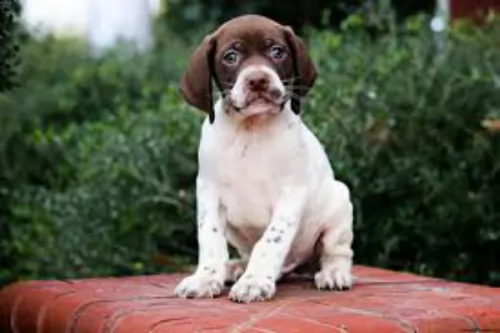 The Braque Francais is a dog which looks much like the German Short-haired Pointer. The Braque Francais (Gascogne) is a large breed dog, standing roughly 56 – 69cm. Weight is most times dependent on height, but the average weighs between 35 and 55 pounds. The dog is attractively lean and muscular and the tails have always been docked, although rules and regulations see the breed with a long tail these days. The natural tail of the Braque Francais is medium length. The eyes of this breed are brown or yellow and the ears are medium in length and floppy. The coat of the Gascogne is short and dense and in two colors – white and chestnut patching and mottling.
The Braque Francais is a dog which looks much like the German Short-haired Pointer. The Braque Francais (Gascogne) is a large breed dog, standing roughly 56 – 69cm. Weight is most times dependent on height, but the average weighs between 35 and 55 pounds. The dog is attractively lean and muscular and the tails have always been docked, although rules and regulations see the breed with a long tail these days. The natural tail of the Braque Francais is medium length. The eyes of this breed are brown or yellow and the ears are medium in length and floppy. The coat of the Gascogne is short and dense and in two colors – white and chestnut patching and mottling.
The dog is a keen tracker and is an excellent game and gun dog with some of them requiring more training than others. Training and socialization makes the Braque Francais an excellent, obedient pet who is eager to please and he is considered to be easily trainable, learning quickly. He loves his human family and is noted for his gentle, friendly nature, and he therefore makes and excellent family pet where there are children and other pets.
 This is a medium sized dog , muscular and strong. Slightly smaller than the Samoyed, the Nenets Laika weighs about 40-55 pounds and is 18 inches tall. The ears are typical Spitz ears and the tail is carried up over the back. The Nenets Herding Laika can have gray, piebald, black or tan coats and some can be solid white and look just like a Samoyed. The coat is a thick, double coat with the undercoat very wooly.
This is a medium sized dog , muscular and strong. Slightly smaller than the Samoyed, the Nenets Laika weighs about 40-55 pounds and is 18 inches tall. The ears are typical Spitz ears and the tail is carried up over the back. The Nenets Herding Laika can have gray, piebald, black or tan coats and some can be solid white and look just like a Samoyed. The coat is a thick, double coat with the undercoat very wooly.
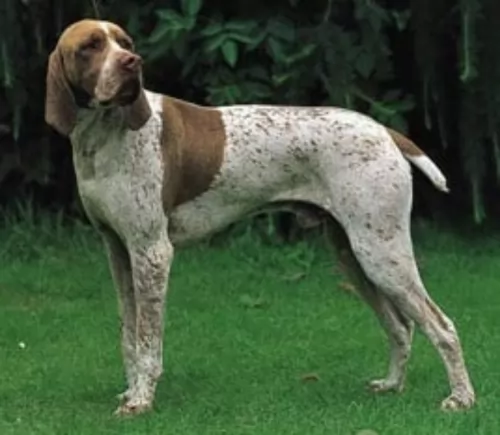 The attractive Braque Francais is a calm, contented dog who is also affectionate, social and intelligent. He is already a well mannered dog but will do even better with training and socialization. However, Braque Francais don’t take well to aggressive training and done the wrong way, the dog can end up being timid and confused.
The attractive Braque Francais is a calm, contented dog who is also affectionate, social and intelligent. He is already a well mannered dog but will do even better with training and socialization. However, Braque Francais don’t take well to aggressive training and done the wrong way, the dog can end up being timid and confused.
Wanting to please and being an intelligent dog, training should be fun, lighthearted but firm. In exchange you’re going to have an awesome friend from this wonderful, loving dog breed.
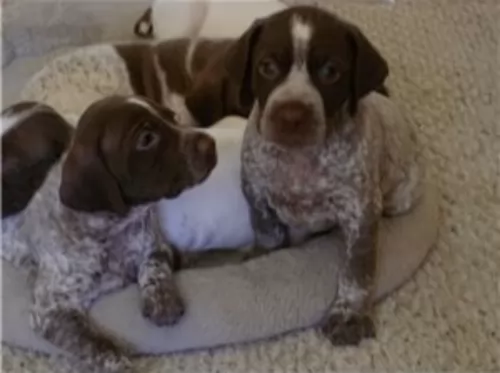 You won’t find many health issues with this active breed but nonetheless hip and joint issues will need to be watched. If you are considering a Braque Français puppy, you’ll want to be selective in choosing a responsible breeder. A healthy puppy with the right environment, can get to up to 15 years of age.
You won’t find many health issues with this active breed but nonetheless hip and joint issues will need to be watched. If you are considering a Braque Français puppy, you’ll want to be selective in choosing a responsible breeder. A healthy puppy with the right environment, can get to up to 15 years of age.
Ectropion and entropion in dogs affect their eyelids. Ectropion is where the eyelids roll outward, whereas entropion is where the eyelids curve inward, irritating the eye. Because visual and skeletal problems occur in this breed, it can be recommended that owners have their pets tested by both the Canine Eye Registration Foundation as well as the Orthopedic Foundation for Animals.
 For the most part the Nenets Herding Laika is a healthy breed and very hardy. They do however have some propensities for some illnesses and conditions.
For the most part the Nenets Herding Laika is a healthy breed and very hardy. They do however have some propensities for some illnesses and conditions.
Diabetes Mellitus – can be treated with medication and is usual seen in middle age -after 7 years of age.
PRA – Progressive Retinal Atrophy – Slow loss of vision and this is a genetic disease – leads to blindness.
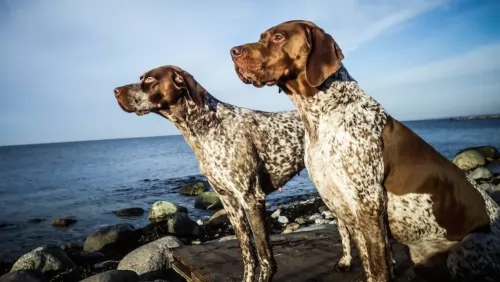 Brushing the coat twice a week will get rid of loose hairs and maintain the sheen of the coat. Also, as a floppy eared breed, attention should be given to the ears to prevent infections. He will also need to have his teeth brushed with dog toothpaste and brush to prevent the build-up of damaging plaque and his nails will also require a clipping if they don’t manage to wear down naturally.
Brushing the coat twice a week will get rid of loose hairs and maintain the sheen of the coat. Also, as a floppy eared breed, attention should be given to the ears to prevent infections. He will also need to have his teeth brushed with dog toothpaste and brush to prevent the build-up of damaging plaque and his nails will also require a clipping if they don’t manage to wear down naturally.
Daily activity will be needed for this dog and he will want a walk every day. He certainly isn’t a dog you can leave indoors or outside in your backyard day after day. Any activities that require physical exertion will be good because they are exceptional athletes. If you are a cyclist or a runner, take him with you – he’ll love it.
Your Braque Francais loves energetic activities and for this he will require an excellent nutrient-rich diet. Nutrient-rich dog foods are higher in protein and fat and lower in carbohydrates. It’s important to check out the carbohydrate content in commercial dog foods to avoid those one high in carbohydrates.
Your vet can always advise you on a good quality food and you can always give him your own home-prepared foods which include rice, vegetables and meat. Certainly include some raw meat into his diet every now and then to avoid skin problems. Fresh, cool water must be available to him night and day.
 Be careful that your pup doesn’t grow too fast. They are open to injuries if they grow too fast. Low calorie with protein and not a lot of fat. half a cup of high quality medium breed dog food 3X a day.
Be careful that your pup doesn’t grow too fast. They are open to injuries if they grow too fast. Low calorie with protein and not a lot of fat. half a cup of high quality medium breed dog food 3X a day.
1 1/2 cups high quality medium breed dog food.
athletic and agile
At leaset a walk or two every day. Don’t get overheated as they are used to cold weather. Would be good at agility and herding exercise.